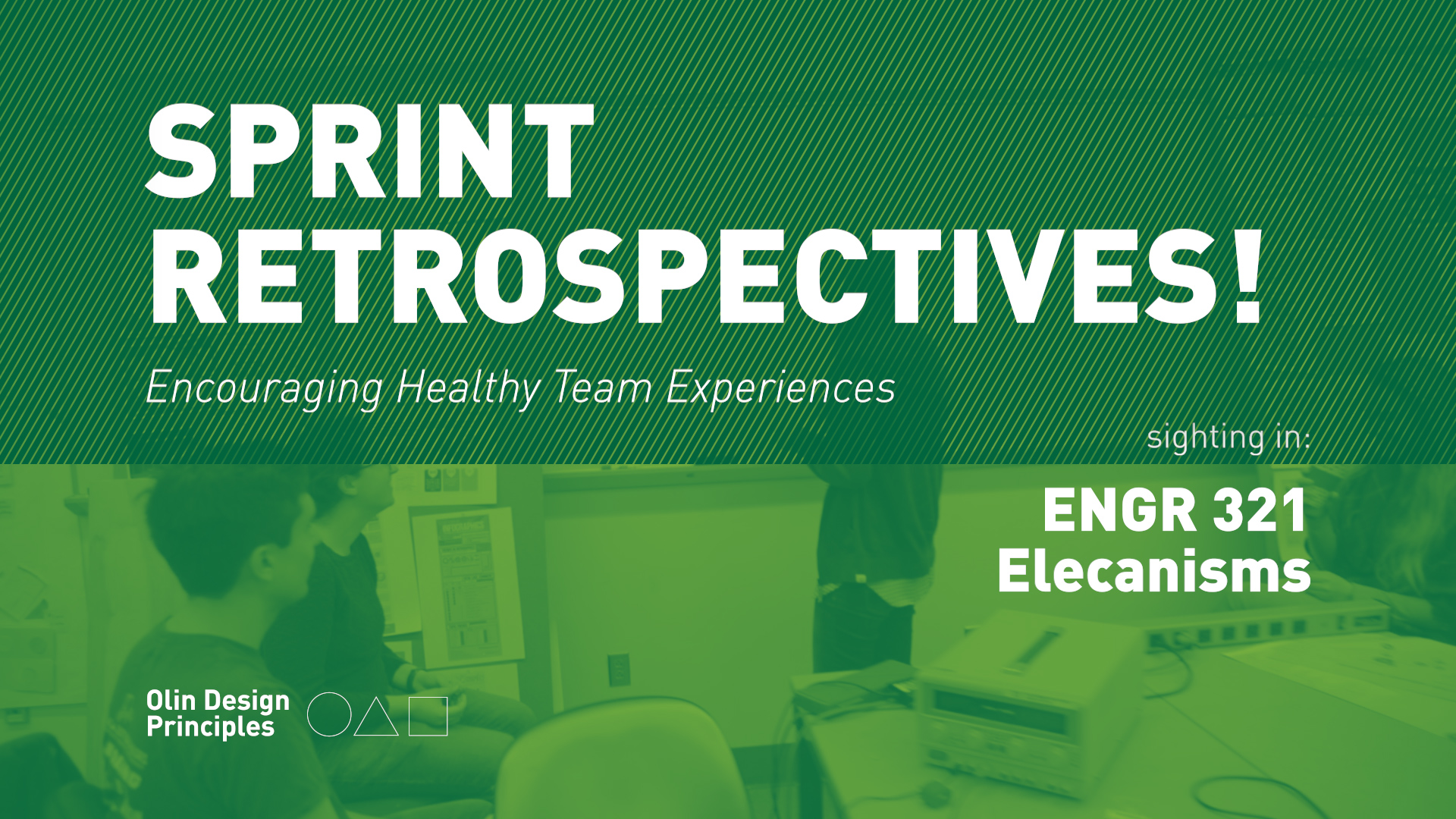Encouraging Healthy Team Experiences
FPO What is it?
Autonomy is the feeling that one is in control of and responsible for their own learning and success – both in terms of what they learn and how they learn.
For example, learners who feel autonomous perceive that:
- “My success in this course is within my control.”
- “My questions, ideas, or approaches are encouraged and valued.”
- “I have opportunities to make decisions about how to approach my learning.”
What it isn’t
Autonomy does not mean giving over complete control and decision-making to students. Fostering autonomy effectively requires an appropriate balance of support and structure, based on students’ current level of knowledge and skill, familiarity with the content to be learned, and the expectations of the task (Jang, Reeve, & Deci, 2010). Novice learners often do not have the requisite knowledge to make effective choices about their learning. This is why giving too much choice to students can sometimes be met with confusion or resistance.
What’s the theoretical basis? Why does it work?
Deci and Ryan’s Self-Determination Theory (Deci et al., 1991; Ryan & Deci, 2000) specifies autonomy as one of three essential psychological needs for positive well-being and learning (the other two needs are competence and relatedness). This theory also discusses the value of intrinsic motivation for learning. Intrinsic motivation—an interest in learning for personal reasons or for its own sake—is more predictive of effective learning than extrinsic motivation—motivation that comes from external sources, such as rewards, grades, or pressure from others.
Feeling autonomous is powerful motivator for learners. Students who feel a sense of personal agency and responsibility for their learning, and who make decisions about and manage their learning, develop stronger intrinsic motivation to learn, leading to deeper learning.
Is there evidence that it works?
Autonomy supportive learning environments positively influence students’ conceptual understanding, creative thinking, grades, self-efficacy, academic persistence, productivity, and psychological well-being (Black & Deci, 2000; Deci et al., 1991; Reeve & Jang, 2006).
Hall and Webb (2014) found that introductory physics students who perceived their instructors as more autonomy supportive reported higher interest and enjoyment in learning physics, less anxiety about taking physics, and developed more intrinsic reasons for studying physics throughout the course. Students who developed more intrinsic reasons for studying physics also had higher performance in the course.
Black and Deci (2000) found that organic chemistry students who perceived greater instructor autonomy support reported increases in autonomous self-regulation, perceived competence, and interest/enjoyment, and decreases in anxiety over the semester. Students who developed more autonomous self-regulation also demonstrated higher performance in the course.
Patall and colleagues (2018) conducted a classroom study of the relationships between student perceptions of high school science teachers’ autonomy-supporting and autonomy-thwarting practices and students’ motivation. Students’ autonomous motivation and engagement increased on days when students perceived their teachers to support their autonomy by:
- providing choices,
- considering their preferences and interests in course activities, - communicating rationales for the importance of activities,
- providing opportunities to ask questions, or
- avoiding uninteresting activities.
What does this principle look like in practice?
-
Provide meaningful choices that support learning
- Provide appropriate choices and the information students need to make effective choices. Students can make choices about: assignments (e.g., choose from a list of topics, choose a question to explore) how to demonstrate their competence (e.g., creating a podcast, video, presentation, or written work) assessment criteria (e.g., write potential exam questions, set due dates, help create rubrics) classroom management (e.g., develop group contracts for collaborative work, create and implement rules for classroom behavior, such as cell phone and laptop use) course content (e.g., dedicate a couple of class days to special topics chosen by students. Ask students to come up with their own ideasand vote or have them vote from a list that you provide.).
-
Solicit input and feedback from students
- Gather mid-semester student feedback on the course, activities, and assignments, and respond to their feedback.
- Acknowledge students’ expressions of negative affect related to the course. If possible, alter the activity to better suit their needs. If you can’t alter it, explain how it contributes to their learning.
- Before review sessions, ask students to indicate which topics they want to be the focus of the session.
- In small courses, meet with students one-on-one to discuss their ideas, learning needs, and goals for the course.
-
Give students ownership of their learning
- Encourage students to contribute ideas and questions, suggest multiple interpretations or solutions to problems, discuss multiple approaches or strategies, and question material (e.g., “Did anyone do it/think about it differently?”).
- Have students set individual goals for their learning and reflect on their progress throughout the course.
- Provide structured guidance and coaching. Urge students along the right path, let students lead and redirect when needed.
- Give students opportunities to show what they know through leading discussions, teaching or summarizing a topic to their classmates, presenting their ideas/experiences related to course concepts or readings, or in-class quizzing or polling.
- Ask students about why they are interested in the topic, rather than telling them why it’s important.
- Ask students to create or identify relevant content or resources for the course (e.g., videos, articles, memes).
Where can I learn more?
Self-Determination Theory has its own website where you can explore the theory and download publications using this theoretical perspective.
The American Psychological Association developed a free online module for educators on Developing Responsible and Autonomous Learners: A Key to Motivating Students. Although this module is designed for K-12 teachers, most ideas translate to the higher education classroom.
If you’re interested in additional autonomy-supportive instructional strategies, the following publications offer practical tips and techniques:
- Kusurkar, R. A., Croiset, G., & Cate, O. T. J. T. (2011). Twelve tips to stimulate intrinsic motivation in students through autonomy-supportive classroom teaching derived from Self-Determination Theory. Medical Teacher, 33, 978-982.
- MacDougall, M. (2008). Ten tips for promoting autonomous learning and effective engagement in the teaching of statistics to undergraduate medical students involved in short-erm research projects. Journal of Applied Quantitative Methods, 3, 223-240.
- Reeve, J. (2009). Why teachers adopt a controlling motivating style toward students and how they can become more autonomy supportive. Educational Psychologist, 44, 159-175.
- Stefanou, C. R., Perencevich, K. C., DiCintio, M., & Turner, J. C. (2004). Supporting autonomy in the classroom: Ways teachers encourage student decision making and ownership. Educational Psychologist, 39, 97-110.
REFERENCES
Black, A. E., & Deci, E. L. (2000). The effects of instructors’ autonomy support and students’ autonomous motivation on learning organic chemistry: A self-determination theory perspective. Science Education, 84, 740-756.
Deci, E. L., Vallerand, R. J., Pelletier, L. G., & Ryan, R. M. (1991). Motivation and education: The self-determination perspective. Educational Psychologist, 26, 325-346.
Hall, N., & Webb, D. (2014). Instructors’ support of student autonomy in an introductory physics course. Physical Review Special Topics – Physics Education Research, 10.
Jang, H., Reeve, J., & Deci, E. L. (2010). Engaging students in learning activities: It is not autonomy support or structure but autonomy support and structure. Journal of Educational Psychology, 102, 588-600.
Patall, E. A., Steingut, R. R., Vasquez, A. C., Trimble, S. S., Pituch, K. A., & Freeman, J. L. (2018). Daily autonomy supporting or thwarting and students’ motivation and engagement in the high school science classroom. Journal of Educational Psychology, 110, 269-288.
Reeve, J., & Jang, H. (2006). What teachers say and do to support students’ autonomy during a learning activity. Journal of Educational Psychology, 98, 209-218.
Ryan, R. M., & Deci, E. L. (2000). Self-determination theory and the facilitation of intrinsic motivation, social development, and well-being. American Psychologist, 55, 68-78.

Sprint Reviews

FPO Sighting

FPO Sighting

FPO Sighting

FPO Sighting

FPO Sighting

FPO Sighting

FPO Sighting

FPO Sighting

FPO Sighting

FPO Sighting

FPO Sighting
